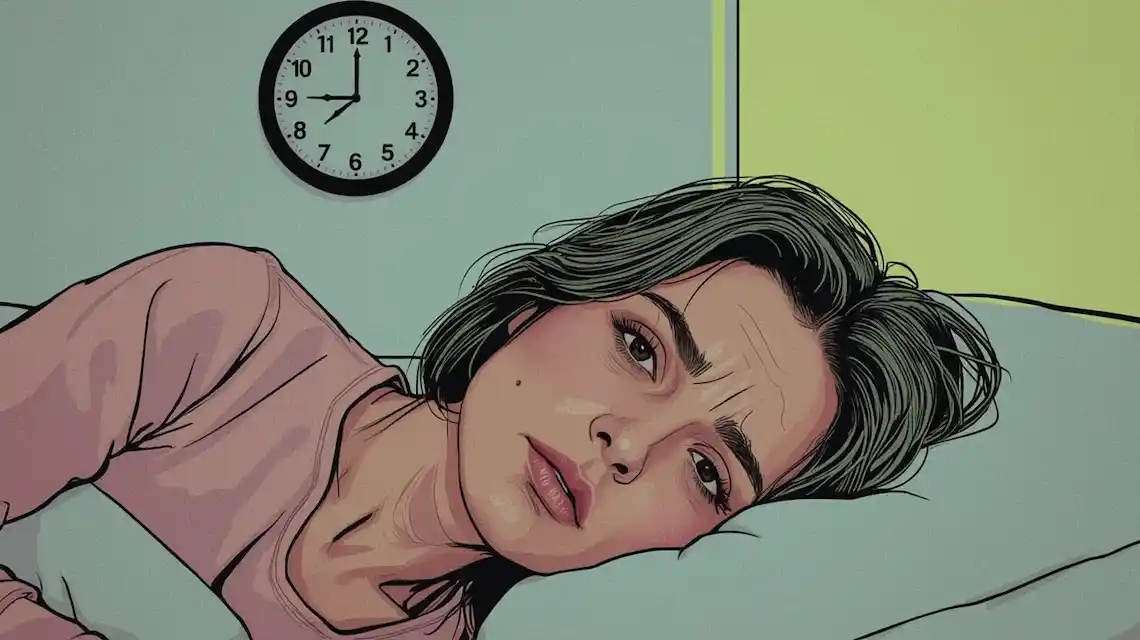Another night of tossing and turning, then the alarm hits and you feel foggy, on edge, and nowhere near ready for the day. Chronic insomnia can drain your energy, mood, focus, and motivation, making even simple tasks feel heavy.
Here is the quick answer to how long does it take to cure chronic insomnia. There is no one-size-fits-all timeline, but most people start to feel real improvement in weeks to a few months with the right plan. Some notice better sleep in 4 to 8 weeks, especially with structured help like CBT‑I (cognitive behavioral therapy for insomnia), while others need a bit longer.
Chronic insomnia means trouble falling asleep, staying asleep, or waking too early, at least three nights a week for three months or more. It often sticks around because habits, stress, or health issues keep it going, even after the original trigger fades.
In this post, you will get a simple path forward. First, a quick look at what really drives chronic insomnia. Then, proven treatment options you can trust, including therapy, routines, and when short-term medication fits. Next, realistic timelines so you know what to expect week by week. Finally, practical tips you can use tonight to start turning the corner.
This is fixable. With a clear plan, steady habits, and support when you need it, sleep can improve faster than you think. Let’s set honest expectations, cut out guesswork, and help you get back to consistent, restorative rest.
What Exactly Is Chronic Insomnia and Why Does It Stick Around?
Chronic insomnia is not one bad week. It is a steady pattern of poor sleep that lasts at least three months, at least three nights a week. About 10% of adults live with it. It lingers because triggers spark it, then habits, stress, and body feedback keep it going. If you are asking how long does it take to cure chronic insomnia, start by pinning down what it looks like and why it persists.
Key Symptoms That Signal Chronic Insomnia
Chronic insomnia shows up at night and during the day. Look for these signs:
- Takes more than 30 minutes to fall asleep: You feel wired in bed, mind racing, body tense.
- Wakes up multiple times: You drift in and out, then stare at the clock.
- Wakes too early and cannot return to sleep: You are up long before the alarm.
- Feels unrefreshed after sleep: Even 7 to 8 hours leave you drained.
- Daytime effects: Fatigue, irritability, brain fog, slower reaction time, and lower productivity.
How is this different from a rough night? Occasional sleeplessness follows a clear cause, like caffeine late in the day, then fades. Chronic insomnia repeats, even when you try to fix it, and it affects your mood, focus, and work or school. Ignoring it can lead to bigger issues, such as low immunity, higher pain sensitivity, anxiety, or depression.
Try this quick check. Track your sleep for one week:
- Note bedtime, wake time, time to fall asleep, wake-ups, and naps.
- Rate energy, mood, and focus each day.
- Watch for patterns that repeat across multiple nights.
Common Causes Behind Long-Term Sleep Struggles
Chronic insomnia often has more than one cause, and they feed each other.
- Psychological: Ongoing stress, anxiety, or low mood keep your brain on alert. Example: work pressure raises worry, which spikes at bedtime.
- Physical: Pain, reflux, asthma, thyroid issues, sleep apnea, menopause, and some medications disrupt sleep. Stimulants and certain antidepressants can shift sleep timing.
- Behavioral: Irregular bedtimes, long naps, late caffeine or alcohol, heavy dinners, and bright screens signal your brain to stay awake. Work stress can lead to late-night scrolling, which delays sleep and builds a new habit loop.
If these patterns sound familiar, talk with a doctor to rule out medical causes like sleep apnea or medication side effects. Then focus on steady sleep habits, a calm wind-down, and consistent wake times. This sets the stage for faster progress on your timeline.
Proven Ways to Treat Chronic Insomnia Effectively
If you are asking how long does it take to cure chronic insomnia, start with methods that retrain your sleep system, not just knock you out. The best results come from a plan that targets habits, thoughts, body cues, and stress. Most people improve faster when they pair a core therapy with simple daily practices.
Why CBT-I Is the Top Choice for Lasting Results
CBT-I is the gold standard for chronic insomnia. It teaches your brain and body to sleep on their own again. A typical program runs 6 to 8 weeks with a trained therapist. You track sleep in a diary, test beliefs about sleep, and change what you do in bed.
Here is what it includes:
- Sleep diary: You record bedtimes, wake times, wake-ups, and naps. This shows patterns and guides changes.
- Stimulus control: Your bed is for sleep and intimacy only. If you cannot sleep, you get up, do something calm, then return when sleepy.
- Sleep restriction: You limit time in bed to match actual sleep, then expand as sleep gets deeper. This builds sleep drive and reduces time awake at night.
- Cognitive tools: You challenge worry loops and drop rules that backfire, like clock watching or chasing perfect sleep.
CBT-I helps 70 to 80 percent of people sleep better. Results often start in a few weeks, and gains hold after treatment ends. There are no next-day side effects, and it fixes the cause, not just the symptoms. For many, this is the fastest path on the timeline to better sleep.
When to Consider Medications and Natural Remedies
Short-term medication can help you reset, but use it with a plan. Doctors may suggest a melatonin agonist or a sedative for 2 to 4 weeks. These can ease severe nights while you start CBT-I. Risks include dependency, rebound insomnia, and morning grogginess.
Natural options fit well as support:
- Herbal teas like chamomile can calm pre-bed tension.
- Magnesium may aid relaxation and reduce muscle tightness.
- Aromatherapy with lavender can cue your wind-down routine.
Many prefer natural add-ons to avoid grogginess. Always check with your doctor, especially if you take other meds or have health issues.
Layer in daily habits that boost sleep pressure and calm the nervous system:
- Relaxation: Breath work, progressive muscle relaxation, or a short body scan.
- Exercise: Aim for regular daytime movement, not late at night.
- Diet: Cut late caffeine, heavy dinners, and alcohol near bedtime.
The most reliable plan pairs CBT-I with steady routines. Use meds only as a short bridge. For chronic cases, work with a professional so your timeline is clear and your progress sticks.
Realistic Timelines: How Long Until You Sleep Like a Baby Again?
You want straight answers. How long does it take to cure chronic insomnia? Most people see early wins in 2 to 4 weeks, then stronger, steadier sleep in 1 to 6 months. The range depends on what is driving your insomnia and how consistent you are with treatment. CBT-I often brings the fastest, most durable results, while lifestyle changes build momentum. Medications can help for a short reset, but they do not cure insomnia.
Factors That Speed Up or Slow Down Your Recovery
Progress is not random. A few key factors shape your timeline.
- Age: Older adults often need more time. Sleep drive changes with age, so results can take extra weeks.
- Commitment to changes: Consistency wins. A stable wake time, a wind-down routine, and following your plan every day accelerate results.
- Co-existing conditions: Sleep apnea, pain, reflux, thyroid issues, or depression can slow improvement. Address these in parallel.
Tips to move faster:
- Keep the same wake time daily to anchor your body clock.
- Set a consistent bedtime window that matches your sleep need.
- Avoid naps while retraining sleep, unless advised by a clinician.
- Manage stress with breath work, a brief body scan, or a short journaling session 1 to 2 hours before bed.
- Cut late caffeine and alcohol to improve sleep depth.
Key timelines:
- CBT-I: Noticeable gains in 4 to 8 weeks.
- Lifestyle changes: Clear improvements in 2 to 6 weeks.
- Medications: Faster symptom relief, not a cure. Best as a short bridge.
Many programs report that about 50 percent of people improve within one month of structured therapy. Stick with it. Small wins stack.
What to Expect Week by Week in Your Journey
You will move through stages. Use them as a guide, not a strict rule.
Week 1 to 2:
- Initial adjustments. You track sleep, tighten your schedule, and start stimulus control. Minor improvements appear, like shorter time to fall asleep.
Month 1:
- Better sleep efficiency. You spend less time awake in bed. Energy and focus begin to lift.
Month 2 to 3:
- Deeper, more stable sleep. Fewer wake-ups. Your bedtime feels less tense. Many hit their best stretch here.
Beyond 3 months:
- Maintenance. You expand time in bed carefully, keep your wake time steady, and protect your routine during stress or travel.
A simple timeline idea to visualize: Start → Week 2 (small wins) → Week 4 to 8 (steady gains) → Month 3+ (maintenance and confidence)
Track progress in a sleep diary and celebrate trends, not single nights. Consistency, support, and addressing root causes answer the question, how long does it take to cure chronic insomnia. Stay with the plan. Persistence pays off.
Quick Tips to Boost Your Sleep and Shorten Recovery Time
Small daily changes can speed up your progress and make nights calmer. Use these quick wins to support therapy and move your timeline faster. If you are asking how long does it take to cure chronic insomnia, these habits help you stack early wins in weeks, not months. Start with one or two changes, then build from there.
Build a Sleep-Friendly Daily Routine
A steady routine anchors your body clock. It keeps your circadian rhythm on time, which helps you fall asleep faster and wake up with more energy.
- Set a fixed wake time: Pick a time and stick to it, even on weekends. This trains your brain to release sleep and wake hormones at the right times.
- Dim lights in the evening: Lower brightness 2 hours before bed. Use warm bulbs. Less light signals the body to make melatonin.
- Avoid screens 1 hour before bed: Blue light delays melatonin. Read, stretch, or journal instead.
- Create a wind-down ritual: Keep it simple and repeatable. Try a warm shower, light stretching, and a short book chapter.
- Keep the room cool, dark, and quiet: Aim for 60 to 67°F. Use blackout curtains and a fan or white noise.
- Limit caffeine after noon: Even small amounts can linger and fragment sleep.
- Skip weekend lie-ins: They reset your clock and make Sunday night harder.
Example night routine: lights down at 8:30, phone away at 9, breath work at 9:15, in bed at 9:45.
Lifestyle Tweaks That Make a Big Difference Fast
These simple choices build sleep pressure, calm stress, and ease you into deeper sleep within weeks.
- Light dinners: Eat earlier, with protein, veggies, and healthy carbs. Avoid heavy, spicy, or high-fat meals within 3 hours of bed.
- Move daily: Take a 30 minute brisk walk most days. Regular exercise improves sleep in about 4 weeks. Finish workouts at least 3 hours before bed.
- Relaxation practice: Try deep breathing (inhale 4, exhale 6) for 5 minutes. Add a short body scan or gentle yoga.
- Mindfulness or journaling: Do a quick brain dump 1 to 2 hours before bed. Capture to-dos and worries so you do not ruminate in bed.
- Avoid late alcohol: It may help you doze off, but it disrupts deep sleep and causes wake-ups.
- No long naps: If you must nap, keep it under 20 minutes and before 3 p.m.
These habits work best together. Lock in your wake time, add a nightly wind-down, and walk daily. You will reduce time to fall asleep, cut wake-ups, and move closer to a clear answer to how long does it take to cure chronic insomnia.
Conclusion
Chronic insomnia is treatable. Timelines vary, but hope is real when you follow a clear plan. Most people notice early gains in weeks, then steadier sleep in a few months. The answer to how long does it take to cure chronic insomnia depends on your actions, not luck.
Start with proven steps. Book an appointment with your doctor to check for medical factors. Begin CBT-I with a qualified provider, or a structured program, and commit to the process. Keep a daily sleep diary to track time in bed, time asleep, and wake-ups. Hold a consistent wake time, build a calm wind-down, and pause late caffeine and alcohol. Use short-term medication only with guidance, and as a bridge while you retrain sleep.
Expect progress, not perfection. Look for shorter time to fall asleep, fewer long wake-ups, and better daytime energy. Protect your wins by keeping routines steady during stress or travel. If sleep apnea, pain, or mood symptoms are present, treat them alongside your sleep plan.
You are closer than you think. Stick with your plan, celebrate small wins, and keep moving forward. Restful, reliable nights are within reach.
This content is for education only and not medical advice. Consult your healthcare provider for personal guidance.
Related post: Why Do I Have Insomnia At Night?
FAQ: How Long Does It Take to Cure Chronic Insomnia
Is chronic insomnia curable, or only manageable?
Many people recover, some manage it long term. Insomnia is a learned pattern, so it can improve. With the right plan, most see solid gains and fewer bad nights.
How long does CBT-I take to work?
Most complete CBT-I in 6 to 8 weeks. Many notice better sleep in 2 to 4 weeks. Gains often keep building for months with practice.
Will I sleep well every night after CBT-I?
No, normal sleepers still have off nights. The goal is faster recovery from bad nights, fewer wake-ups, and less worry about sleep.
How fast do sleep meds work compared to CBT-I?
Meds work within days, sometimes the first night. Benefits stop when you stop the drug, and rebound can occur. CBT-I builds skills that last.
Can insomnia improve without therapy or meds?
Yes, sometimes. Basic changes help, like a consistent wake time and a set wind-down. For chronic insomnia, CBT-I gives faster and more reliable results.
What if I have had insomnia for years?
You can still improve. Long duration can slow progress, but it does not block results. Expect change in weeks, with steady gains after that.
Does anxiety or depression slow recovery?
It can, but you can still improve. Treat both in parallel. Combined care, CBT-I plus therapy or meds for mood, often speeds results.
How long until I fall asleep faster?
With CBT-I, sleep onset often drops within 2 to 4 weeks. Many go from an hour to 20 to 30 minutes. Consistency matters.
How long until fewer night wake-ups?
Wakes usually shrink over 3 to 6 weeks. Better timing, bedroom cues, and stimulus control reduce awake time in bed.
When will my energy and focus feel normal again?
Daytime gains often lag by 1 to 3 weeks. As sleep stabilizes, fatigue and brain fog lift. Light exercise and morning light help.
What if shift work is part of the problem?
Progress takes longer, since schedules fight body clocks. You can still improve with a fixed anchor wake time, planned naps, and light timing.
How long should I try a change before judging it?
Give each change 1 to 2 weeks unless it clearly backfires. For CBT-I steps like sleep restriction, expect the hardest nights in week one.
How do I track progress without obsessing?
Use a simple sleep diary, 2 to 3 minutes each morning. Watch sleep efficiency, time to fall asleep, and time awake at night. Look at weekly trends, not single nights.
Can medical issues slow or block results?
Yes. Sleep apnea, restless legs, pain, thyroid issues, reflux, and alcohol use can stall progress. Address these with your clinician for faster gains.
When should I see a sleep specialist?
If insomnia lasts 3 months or more, or if snoring, gasping, or leg urges occur, book a visit. Seek help sooner if you feel unsafe while driving or at work.
What are realistic timelines by approach?
- CBT-I, 2 to 8 weeks for major gains, months for fine tuning.
- Short term meds, days to help, benefits fade after stopping.
- Lifestyle only, variable, often slow for chronic cases.
How do I prevent relapse after I improve?
Keep a steady wake time, protect a wind-down, and avoid long naps. Use stimulus control when slip-ups start, get out of bed if you cannot sleep. A brief CBT-I refresher often restores progress in days.
Can I speed things up?
Yes. Follow the plan daily, avoid clock watching, keep caffeine to the morning, and get morning light. Move your body most days, even a short walk helps.
What is a good sign that my plan is working?
Your nights feel less chaotic, and your worry about sleep drops. You fall asleep faster, wake less, and bounce back quicker after a rough night.




 How To Remove Sun Tan From Hands
How To Remove Sun Tan From Hands  How to Take Care Your Nails
How to Take Care Your Nails  How to Improve Good Cholesterol (HDL)
How to Improve Good Cholesterol (HDL)  Hormone Health Tips for Women
Hormone Health Tips for Women  Heal Dry Damaged Hair: A Simple Plan That Works
Heal Dry Damaged Hair: A Simple Plan That Works  How to Look Much Younger Without Drastic Changes
How to Look Much Younger Without Drastic Changes